-
today's events
Gallery and Bookshop Hours Chicago Architecture Biennial Jan 01, 2026 - Feb 28, 2026
-
upcoming events
Zosha Warpeha Lampo Performance Series Feb 21, 2026
-
past events
End-of-year Bookshop Sale Dec 13, 2025 - Dec 20, 2025
Eve Aboulkheir Lampo Performance Series Dec 06, 2025 Performance
Leila Bordreuil and Lee Ranaldo Lampo Performance Series Nov 08, 2025
Roc Jiménez de Cisneros Lampo Performance Series Oct 11, 2025
Concepción Huerta Lampo Performance Series Sep 27, 2025 Performance
Madlener House
4 West Burton Place
Chicago, Illinois 60610
Telephone: 312.787.4071
info@grahamfoundation.org
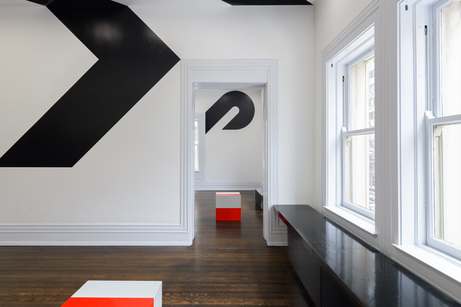
Join us for an introduction to Exits Exist, an exhibition by San Francisco-based Barbara Stauffacher Solomon, including site-specific supergraphics for the Graham Foundation’s Madlener House galleries along with works on paper, artist's books, and a new series of sculptures. Tours are led by Graham Foundation staff and invited guests.
Friday, 12-1 p.m.
July 1 and July 8
REGISTER HERE
Saturday, 2–2:30 p.m.
July 9
REGISTER HERE
Last Thursday of the month, 6:30–7 p.m.
June 30
REGISTER HERE
Group tours are available by request, contact us at info@grahamfoundation.org
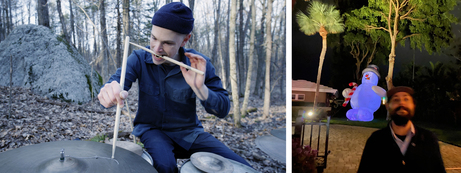
Returning to the Graham Foundation with a limited in-person concert, Lampo presents Intraday by Andrew Lampert and Chris Corsano. This reactivation of the Lampo performance series at the Graham also launches the Lampo Folio, a collection of ten text-based scores created during the pandemic.
Intraday is a musical study of Spotify’s stock fluctuation between 12 p.m. and 1 p.m. on May 13, 2021. The work is a structured improvisation performed in accordance with the ups and downs of the stock price, as represented by 92 line charts in the score. Performers are presented with a wide range of tactics to guide them through a small amount of musical space.
The Lampo Folio, co-edited by Andrew Fenchel and Andrew Lampert, is a collection of text-based scores from ten interdisciplinary artists engaged with sound and language, including Nikita Gale, Sarah Hennies, Bonnie Jones, Andrew Lampert, Jessie Marino, Nour Mobarak, Gala Porras-Kim, Elliot Reed, Sergei Tcherepnin, and Jennifer Walshe. Each commissioned work is published in the form of instructions that can be used to enact an intimate performance in a personal space such as one’s home. The premiere of Intraday coincides with the hour the score was composed and is intentionally presented in the domestic context of the Graham Foundation’s Madlener House, which was a home from 1902–1963.
Since 2010 the Graham Foundation has partnered with Lampo to produce an international performance series held at the Madlener House. Lampo, founded in 1997, is a nonprofit organization for experimental music and intermedia projects.
Note that seating for this performance is very limited. Reservations are required for entry. If you make a reservation and then are no longer able to attend, please cancel your reservation through Eventbrite or email info@grahamfoundation.org to release the spot to someone on the waiting list. Masks are required for all, regardless of vaccination status.
Andrew Lampert (b. 1976, St. Louis) is an artist, archivist, and writer. His eclectic and extensive body of films, videos, performances, and photographs have been exhibited at the Whitney Museum of American Art, J. Paul Getty Museum, Solomon R. Guggenheim Museum, Art Gallery of Ontario, International Film Festival Rotterdam, Toronto Film Festival, and New York Film Festival, among other venues. The former Curator of Collections at Anthology Film Archives, he has preserved hundreds of important films and videos. Recent projects include co-editing and contributing to the text score collection Lampo Folio (2021, Lampo); releasing the album Lush Valley (2021); co-editing the book Tony Conrad: Writings (2019, Primary Information); and co-writing (with Howie Chen) the monthly column “Hard Truths” for Art In America. His new book, William Wegman: Writing by Artist, will be released by Primary Information this spring.
Chris Corsano (b.1975, Englewood, New Jersey) is a drummer who has worked at the intersections of free jazz, avant-rock, and experimental music since the late 1990s. He is a rim-batterer of choice for some of the greatest contemporary purveyors of jazz (Joe McPhee, Paul Flaherty, Evan Parker, Mette Rasmussen) and rock (Sir Richard Bishop, Bill Orcutt, Jim O’Rourke), as well as artists beyond categorization (Björk for her Volta album and world tour, Ghédalia Tazartès, Michael Flower, Okkyung Lee). Appearing on over 150 albums and touring in a wide array of collaborations, Corsano is also a celebrated solo performer, weaving free improvisation, extended percussion techniques, reed instruments, and drum heads resonated by bowed strings into an “ensemble of one.” In 2017, he received the Foundation for Contemporary Arts Grants to Artists Award.
Lampo, established in 1997, supports artists working in new music, experimental sound and other interdisciplinary practices. The Chicago-based organization's core activity has been and remains its performance series. Rather than making programming decisions around tour schedules, Lampo invites selected artists to create and perform new work, and then the organization provides the space, resources and curatorial support to help them fulfill their vision. Lampo also organizes artist talks, lectures, screenings and workshops, and publishes written and recorded documents related to its series.
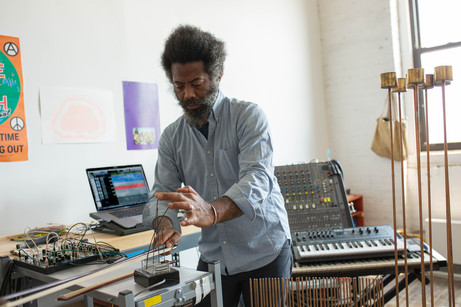
Robert Aiki Aubrey Lowe (b.1975, Kansas City, Mo.) premieres Three-Sided Figure, his new modular synth and voice performance. Lowe is an artist and composer working primarily with voice and modular synthesizers in the realm of spontaneous music. Speaking about his work, he reflects that “the marriage of synthesis and voice has allowed for a heightened physicality in the way of ecstatic music.” The sensitivity of analogue modular systems echoes the organic nature of vocal expression, which in this case is meant to put forth a trancelike state, to usher in a deeper listening through sound and feeling.
Collaborators include Ben Russell, Ben Rivers, Rose Lazar, Hisham Akira Bharoocha, Ben Vida, Lucky Dragons, Alan Licht, Patrick Smith, Monica Baptista, Lee Ranaldo, Kevin Martin, Chris Johanson, Tyondai Braxton, David Scott Stone, Genesis P-Orridge and Rose Kallal, as well as many others. Select appearances include Doug Aitken’s Migration happening at 303 Gallery (2008) and Princeton University (2010), La Suite for Serpentine Gallery (2012), In the Wan Light of Napalm and Moon with Evan Calder Williams (2012), Peradam with Sabrina Ratté at EMPAC (2014), Cinéma du Réel at the Centre Georges Pompidou (2014), performances with Ariel Kalma at Lincoln Center (2015), Unsound Festival and San Francisco Electronic Music Festival (2018), and Tarek Atoui’s Organ Within at Kurimanzutto and the Guggenheim Museum (2019). In November 2014, Lowe premiered Early Hypnagog in the Lampo series. Recent projects include composing the Candyman score (2021), which was on the shortlist to receive an Oscar nomination for Best Original Score, and sound for Rashaad Newsome’s Assembly at the Park Avenue Armory (2022). He lives in Brooklyn, New York.
Since 2010 the Graham Foundation has partnered with Lampo to produce an international performance series held at the Madlener House. Lampo, founded in 1997, is a nonprofit organization for experimental music and intermedia projects.
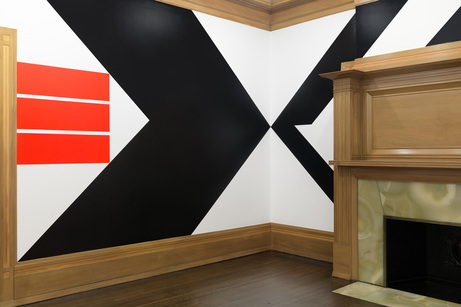
Join us for the final monthly extended gallery and bookshop hours (5–8 p.m.) for our current exhibition, Exits Exist by Barbara Stauffacher Solomon on the last Thursday of the month. A walkthrough of the exhibition led by Graham Foundation staff will begin at 6:30 p.m.
All purchases in the bookshop during evening hours will be 15% off.
Exits Exist, an exhibition by San Francisco-based Barbara Stauffacher Solomon, presents site-specific supergraphics for the Graham Foundation’s Madlener House galleries along with works on paper, artist's books, and a new series of sculptures.
To learn more about the Graham Foundation Bookshop, click here
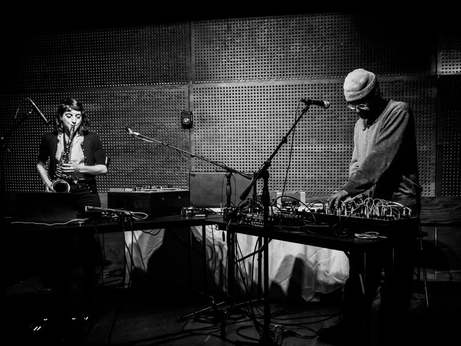
Lea and Ben will present My Words Came Out Slow and Odd, a text-based composition for voices and electronics, trumpet, and reeds.
The duo's new work pushes the boundaries of language and intelligibility and extends the human voice through the aid of creative electronic processing. What new modes of communication emerge when language is in a constant state of morphology? How quickly can we recalibrate to allow for complex meaning to be projected onto abstraction? My Words Came Out Slow and Odd is a clattering, psychedelic whirl of heteroglossia, smears, and stutters.
Ben Vida and Lea Bertucci began collaborating during the summer of 2021, while living on opposite sides of the same mountain outside of Woodstock, New York. What started as a conversation between friends slowly developed into a unique form of nonhierarchical improvisation, one that examines the very nature of creative dialogue.
Since 2010 the Graham Foundation has partnered with Lampo to produce an international performance series held at the Madlener House. Lampo, founded in 1997, is a nonprofit organization for experimental music and intermedia projects.
Note that seating for this performance is very limited. Reservations are required for entry. If you make a reservation and then are no longer able to attend, please cancel your reservation through Eventbrite or email info@grahamfoundation.org to release the spot to someone on the waiting list.
Ben Vida (b.1975, Dubuque, Iowa) is a composer, improviser and artist. His work explores aural phenomena, language, durations and systems. In the mid-1990s he co-founded the minimalist quartet Town & Country in Chicago. Later, after a move to Brooklyn, he shifted his focus to electronics and systems-based compositions that used psychoacoustics, aural phenomena and advanced synthesis techniques. Since 2015 he has composed pieces that combine his interest in experimental writing with his love of singing with people.
Slipping Control (2015), Vida’s multimedia composition for voices, video and electronics, premiered at Audio Visual Arts in New York and then traveled to Los Angeles and Athens. His six-hour performance piece for vocal ensemble and electronics, Reducing the Tempo to Zero premiered for Lampo in June 2016 and was staged at The Kitchen, New York; STUK in Leuven, Belgium; and Centro Pecci, Prato. And So Now (2018) was commissioned for the Brooklyn Academy of Music and performed at the BAM Fisher Space. Always Already, which was created in collaboration with the Yarn/Wire ensemble and vocalist Nina Dante, premiered for Lampo in March 2020 and was also performed in New York.
In addition to these works, he has developed projects with Marina Rosenfeld, Lucio Capece, and Lea Bertucci. He has released his music with many labels including Shelter Press, Kranky, PAN, iDEAL and 901Editions, among others. Vida teaches in the M.F.A. program at Brooklyn College.
Lea Bertucci (b.1984) is an artist who works with sound. Her projects describe relationships between acoustic phenomena and biological resonance. In addition to her longstanding practice with woodwind instruments, her work incorporates multichannel speaker arrays, radical methods of free improvisation, and creative misuses of audio technology. Recent projects have tapped into a space's unique acoustic properties, as in 2018’s Acoustic Shadows, a suite of compositions for the enclosed hollow body of the Deutz Suspension Bridge in Cologne.
She has released several solo albums and a number of collaborative projects, including Metal Aether and Resonant Field (NNA Tapes), and Phase Eclipse with Amirtha Kidambi (Astral Spirits). In 2021 she founded Cibachrome Editions and released A Visible Length of Light. Earlier this year the label issued Murmurations, her debut recording with Ben Vida.
Bertucci has performed her work throughout the U.S. and Europe, including at the Museum of Modern Art, Blank Forms, Gagosian Gallery, Issue Project Room, Pioneer Works, and The Kitchen, New York; the Walker Art Center, Minneapolis; Tempo Reale, Florence; Muziekgebouw, Amsterdam; Museo Reina Sofía, Madrid; and at international festivals, including Brückenmusik, Cologne; Sound of Stockholm, Stockholm; ReWire, The Hague; and Unsound, Kraków, among others.
Additionally, Bertucci has been an artist in residence at the Bemis Center for Contemporary Arts, Omaha; MacDowell, Peterborough, N.H.; Headlands Center for the Arts, Sausalito, Calif.; and Issue Project Room, New York. Bertucci's work has been commissioned by the INA GRM in Paris, Quartetto Maurice in Turin, and ARS Nova Workshop in Philadelphia.
Lampo, established in 1997, supports artists working in new music, experimental sound and other interdisciplinary practices. The Chicago-based organization's core activity has been and remains its performance series. Rather than making programming decisions around tour schedules, Lampo invites selected artists to create and perform new work, and then the organization provides the space, resources and curatorial support to help them fulfill their vision. Lampo also organizes artist talks, lectures, screenings and workshops, and publishes written and recorded documents related to its series.
Photo: Peter Ganushkin
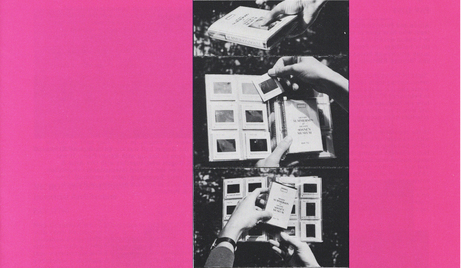
6 p.m. Introductory talk by curator Florencia Alvarez Pacheco, followed by a conversation with Felicity Scott and Mark Wasiuta
Reception to follow
Join us for a reception and introductory remarks to celebrate the opening of our fall exhibition Pidgeon Audio Visual: Architects Speak for Themselves in the second-floor galleries. The conversation with curator Florencia Alvarez Pacheco begins at 6 p.m. in the third-floor ballroom. Alvarez Pacheco will be joined by Felicity Scott and Mark Wasiuta, co-directors of the Critical, Curatorial, and Conceptual Practices in Architecture (CCCP) program, at Columbia University, Graduate School of Architecture, Planning and Preservation (GSAPP).
Mining the Pidgeon Audio Visual (PAV) series—a collection of over 200 mail order tape/slide talks initiated in 1979 by renowned editor of London-based magazine Architectural Design, Monica Pidgeon—this exhibition features a selection of the talks and accompanying slide presentations by leading architects and designers produced between 1979 and 1989. At the Graham, talks by Reyner Banham, Roberto Burle Marx, Charles Correa, Balkrishna V. Doshi, Frank Gehry, Myron Goldsmith, Zaha Hadid, Lawrence Halprin, Kisho Kurokawa, Esther McCoy, Cedric Price, James Wines and Alison Sky (SITE), Alison & Peter Smithson, Stanley Tigerman, and Anne Tyng will be shown in their original format on slide projectors, with synchronized audio accessed on personal mobile devices. Drawing from the archives of Royal Institute of British Architects; the Archives of American Art, Smithsonian Institution; and the Graham Foundation—which supported Pidgeon and PAV with a grant in 1983—the exhibition looks at the PAV series as an alternative education platform and a new model for the development and distribution of ideas in architecture and design.
Exits Exist, site-specific supergraphics by San Francisco-based Barbara Stauffacher Solomon (b. 1928) for the Graham Foundation’s Madlener House are also on view throughout the galleries.
Florencia Alvarez Pacheco is an architect and curator who teaches at the School of Architecture, Design and Urbanism at the University of Buenos Aires. She holds a master’s degree in Critical, Curatorial, and Conceptual Practices in Architecture from Columbia University, GSAPP. She was assistant exhibitions coordinator at the Arthur Ross Architectural Gallery where she acted as assistant curator for Environmental Communications: Contact High, Information Fall-Out: Buckminster Fuller’s World Game, Les Levine: Bio-Tech Rehearsals, 1965–1975, and cocurator for Every Building in Baghdad: The Rifat Chadirji Archives at the Arab Image Foundation, and Detox USA among other exhibitions. Her work has been exhibited at the Canadian Centre for Architecture, the Graham Foundation, the Istanbul Design Biennial, and LAXART. Her research focuses on the implications and challenges of diverse techno-pedagogical experiences from the postwar period at the convergence of politics, education, and media.
NOTE: The audio component of the Pidgeon Audio Visual installation is only accessible to stream in the galleries through the exhibition's dedicated website on a mobile device. Headphones are required; it is recommended guests bring their own. As needed, headphones can be borrowed at the Graham.
The first-floor galleries and bookshop are accessible via outdoor lift. Please call ahead to make arrangements. The second-floor galleries and the third-floor ballroom, where events are held, are only accessible by stairs.
Masks are strongly encouraged. Visitors to the Graham Foundation understand that there is an inherent risk of exposure to COVID-19 in any public space where people are present. Chicago’s current COVID-19 Community Risk Level is LOW.
For more information on the exhibition, Pidgeon Audio Visual: Architects Speak for Themselves, click here.
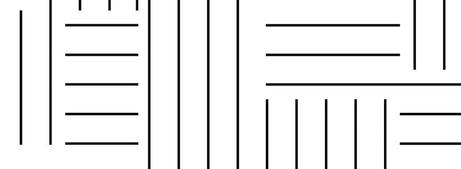
The Graham Foundation is pleased to partner with the Chicago Architecture Biennial to host the Chicago Design Summit, led by the Floating Museum—artistic team for CAB 5, the fifth edition of the Chicago Architecture Biennial, This is a Rehearsal, opening September 2023. The Summit convenes leading practitioners to explore emerging ideas in contemporary architecture and design and serves as a forum for research and the development of the CAB 5 program.
Introduction by the Floating Museum
10:30 a.m.
Session 1: Rehearsing Critique
11 a.m.–12:30 p.m.
This panel explores rehearsal as a practice of systemic and structural critique—living with and within systems to identify what has been overlooked, unconsidered, and uninvestigated—to establish a duty and standard of care as a prerequisite to performative, political, organizational, or environmental engagements or actions.
Panelists: Ionit Behar, associate curator, DePaul Art Museum (Chicago); Andrea Carlson, artist (Chicago); Ibrahim Mahama, artist (Tamale, Ghana); Anjulie Rao, journalist (Chicago); Florencia Rodriguez, director, School of Architecture at the University of Illinois Chicago (Chicago)
Facilitator: Kerry Cardoza, journalist (Chicago)
Lunch Break
12:30–1:30 p.m.
Session 2: Rehearsing Relations
1:30–3 p.m.
This panel explores rehearsal as a practice of individual and collective attunement to build organizational power through mutual understanding.
Panelists: Jha D Amazi, director of the Public Memory and Memorials Lab, principal, MASS. (Boston); Skyla Hearn, cofounder, The Blackivists (Chicago); Erin Harkey, commissioner, Department of Cultural Events and Special Affairs (Chicago); Asad Jafri, cultural producer/artist (Chicago); Ujijji Davis Williams, landscape architect, founder, JIMA Studio (Detroit)
Facilitator: Megha Ralapati, program director, fellowships, CEC ArtsLink (Chicago)
Session 3: Rehearsing Production
3:15–4:45 p.m.
This panel explores rehearsal as a practice of production through improvisation, speculation, and iterative development in response to social and climatic change.
Panelists: Meida Teresa McNeal, artistic/managing director, Honey Pot Performance (Chicago); Dan Peterman, artist, founder, Experimental Station (Chicago); Vyjayanthi Venuturupalli Rao, anthropologist (New York); Chris Reed, landscape architect, founding principal, STOSS (Cambridge); Feda Wardak, architect, director, Aman Iwan (Paris)
Facilitators: Karla Sierralta and Brian Strawn, cofounders, Strawn Sierralta (Honolulu)
Closing performance and reception
5 p.m.
The Summit is made possible with support from the National Endowment for the Arts and Graham Foundation.
Click here to learn more about the Chicago Architecture Biennial
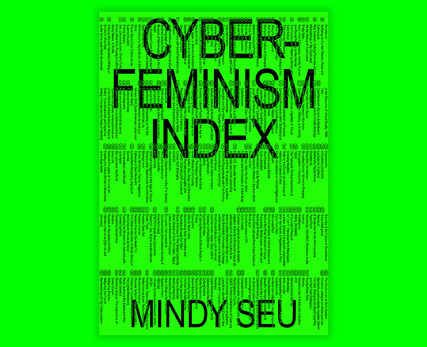
Join us for a performative lecture and discussion to launch the Cyberfeminism Index. Seu will be joined in conversation with artist Lee Blalock. Edited by designer, professor, and researcher Mindy Seu, Cyberfeminism Index gathers more than 700 short entries of radical techno-critical activism, feminist manifestos, hackerspaces, hardware, and wetware education and net art from 1991 to 2020, starting with an excerpt from Donna Haraway’s seminal essay “A Cyborg Manifesto.” Its online complement, cyberfeminismindex.com (2020), is a living, online index that was commissioned by Rhizome and premiered with New Museum. Its print form, published by Inventory Press, was supported by a Graham Foundation grant in 2021.
ABOUT CYBERFEMINISM INDEX
In Cyberfeminism Index, hackers, scholars, artists, and activists of all regions, races, and sexual orientations consider how humans might reconstruct themselves by way of technology. When learning about internet history, we are taught to focus on engineering, the military-industrial complex, and the grandfathers who created the architecture and protocol, but the internet is not only a network of cables, servers, and computers. It is an environment that shapes and is shaped by its inhabitants and their use.
The creation and use of the Cyberfeminism Index is a social and political act. It takes the name cyberfeminism as an umbrella, complicates it, and pushes it into plain sight. Edited by designer, professor, and researcher Mindy Seu, it includes more than 700 short entries of radical techno-critical activism in a variety of media, including excerpts from academic articles and scholarly texts; descriptions of hackerspaces, digital rights activist groups, and bio-hacktivism; and depictions of feminist net art and new media art.
Both a vital introduction for laypeople and a robust resource guide for educators, Cyberfeminism Index—an anti-canon, of sorts—celebrates the multiplicity of practices that fall under this imperfect categorization and makes visible cyberfeminism’s long-ignored origins and its expansive legacy.
Advance copies will be available for purchase in the Graham Foundation bookshop during the event. Pre-order copies are available now on inventorypress.com. Follow the international Cyberfeminism Index book launch tour on tour.cyberfeminismindex.com
Mindy Seu (b. 1991, California) gathers the histories of technology to analyze and inform contemporary society. Trained as a graphic designer, she works collaboratively across the disciplines of design, art, and technology to document overlooked voices. These projects are expressed in a variety of forms, from archival projects and techno-critical writing to performative lectures and resource sharing. Seu’s ongoing Cyberfeminism Index (cyberfeminismindex.com), which gathers three decades of online activism and net art from 1991 to the present, was commissioned by Rhizome and presented at the New Museum in its online form. Its print form, published by Inventory Press, is a recipient of a Graham Foundation grant. Her work is both technological and interdisciplinary, marking the ways that online environments intersect with issues of race, gender, culture, and power. She is regularly invited to present on alternative archival projects and contemporary feminism by cultural institutions (Barbican Centre, New Museum), academic institutions (Columbia University, Central Saint Martins), and mainstream platforms (Google, Pornhub, SSENSE). Seu has been a resident at MacDowell, Sitterwerk Foundation, Pioneer Works, and Internet Archive, and holds an M.Des. from Harvard University Graduate School of Design and a bachelor of arts in design media arts from the University of California, Los Angeles. She is currently assistant professor at Rutgers Mason Gross School of the Arts and critic at Yale School of Art.
Lee Blalock is a Chicago-based artist and educator presenting alternative and hyphenated states of being through technology-mediated processes. Interested in how technologies support the idea of impossible anatomies, behaviors, and performances, her work is an exercise in body modification by way of amplified behavior or "change-of-state". Lee’s interests include embodied cognition, anatomy and biomechanics, bionics, mechatronics, human/non-human entanglement, and computational abstraction. She has presented work domestically, internationally, and virtually at many institutions including Ars Electronica, the wrong biennale, NYU Abu Dhabi Art Gallery, Experimental Sound Studio (Chicago), ICA (Philadelphia), 205 Hudson Gallery (NY), and the Art Institute of Chicago. Lee is an Assistant Professor in the Art and Technology Studies Department at the School of the Art Institute of Chicago and practices various forms of embodiment as an everyday athlete.
Cyberfeminism Index is published by Inventory Press and distributed by Distributed Art Publishers and funded by the Graham Foundation, Rhizome, and Feral File, and is made possible in part by the Rutgers University Research Council, Pratt Institute, Pioneer Works, and Cita Press.
Related Graham Foundation supported projects:
2021 grant to Mindy Seu for the publication Cyberfeminism Catalog
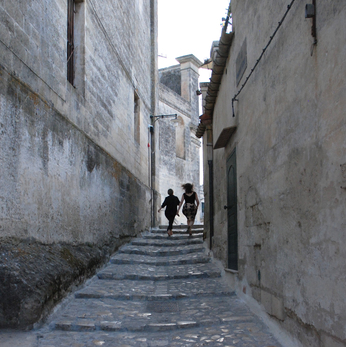
Silvia Tarozzi and Deborah Walker perform the United States premiere of Canti di guerra, di lavoro e d’amore, a transcription and reinterpretation of Italian folksongs from their birthplace, the rural Emilia-Romagna region, for violin, cello, and voice.
Tarozzi and Walker reflect, "These songs come from the first decades of the twentieth century and from the period of World War II, but some of them have older roots. The melodies and especially the lyrics have been transformed over time through oral transmission and adapted to different social, working, and historical contexts. One of the strongest influences of our project is the repertory of songs sung by choirs of female rice field workers, called the Mondine."
Since 2010 the Graham Foundation has partnered with Lampo to produce an international performance series held at the Madlener House. Lampo, founded in 1997, is a nonprofit organization for experimental music and intermedia projects.
Note that seating for this performance is very limited. Reservations are required for entry, link to register via eventbrite coming soon. If you make a reservation and then are no longer able to attend, please cancel your reservation through Eventbrite or email info@grahamfoundation.org to release the spot to someone on the waiting list.
Silvia Tarozzi (b.1975, Bologna, Italy) and Deborah Walker (b.1981, Reggio Emilia, Italy) share a friendship that has evolved into a 20-year artistic partnership. Their music is characterized by a profound interplay, a focus on the acoustic qualities of their instruments, and the search for new possibilities in tunings, gestures, and sound. Together they have explored different musical forms and have worked in several varied projects, including Ensemble Dedalus, a contemporary music ensemble based in Montpellier, France, and Italian art pop band, Offlaga Disco Pax. Their long collaboration with composers Éliane Radigue, Pascale Criton, and Philip Corner have led to the creation of numerous new works. The duo has played at many international venues and festivals, including Huddersfield Contemporary Music Festival, Huddersfield, England; Fondation Cartier, Paris; Biennale Musica, Venezia; Angelica Festival, Bologna; Festival Musique Action, Nancy, France; Festival Futurs Composés, Paris; Fast Forward, Teatro Dell'Opera Di Roma, Rome; Tectonics, Glasgow; and Café Oto, London. Their recordings have been released on Potlatch and Unseen Worlds.
Lampo, established in 1997, supports artists working in new music, experimental sound, and other interdisciplinary practices. The Chicago-based organization's core activity has been and remains its performance series. Rather than making programming decisions around tour schedules, Lampo invites selected artists to create and perform new work, and then the organization provides the space, resources, and curatorial support to help them fulfill their vision. Lampo also organizes artist talks, lectures, screenings, and workshops, and publishes written and recorded documents related to its series.
Lampo gratefully acknowledges additional support provided by the Italian Cultural Institute of Chicago.
Unless otherwise noted,
all events take place at:
Madlener House4 West Burton Place, Chicago
GALLERY AND BOOKSHOP HOURS
2025 Chicago Architecture Biennial
SHIFT: Architecture in Times of Radical Change
Sep 19, 2025–Feb 28, 2026
Wed–Sat, 12–5 p.m.
CONTACT
312.787.4071
info@grahamfoundation.org
Accessibility
Events are held in the ballroom on the third floor which is only accessible by stairs.The first floor of the Madlener House is accessible via an outdoor lift. Please call 312.787.4071 to make arrangements.
Copyright © 2008–2026 Graham Foundation. All rights reserved.